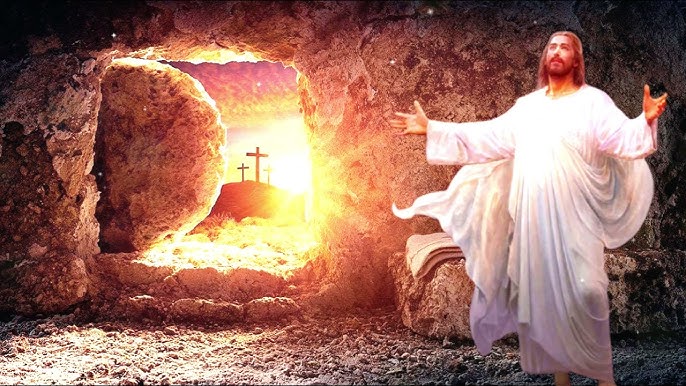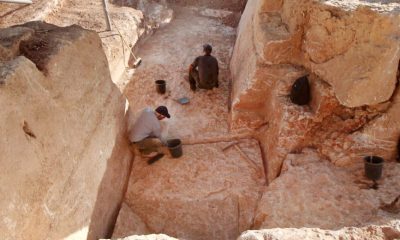Articles
4 ways Isaiah shows Jesus’ trustworthiness

Trusting others presents massive challenges in our fallen world. Everyone has been corrupted by sin, and therefore fails to be fully faithful or trustworthy. As Proverbs 20:6 says, “Many a man proclaims his own loyalty, but who can find a trustworthy man?”
While humans prove to be both distrustful and untrustworthy, God presents Himself as the One we can supremely trust for everything in this life and beyond the grave. We see an intentional emphasis in Scripture on the trustworthiness of God, but Scripture does not command us to have blind faith. The Lord instructs us to trust Him, and then He demonstrates He is worthy of our trust. God never speaks, and then fails to act. He always proves Himself faithful.
Despite this truth, we often struggle to trust God, which manifests itself when we give in to sin in times of various trials and temptations. So how do we grow our trust of our Lord and His power over our sin?
We find a helpful answer to this question in Isaiah 53. Here, God reveals His Suffering Servant, the Lord Jesus as eminently trustworthy. Whether we suffer because of trials or temptations, Jesus can be trusted to see us through and bring God’s covenant promises to fruition.
There are four ways Isaiah shows Jesus’ trustworthiness in this passage.
First, Jesus humbled Himself when we were proud.
At the start of this chapter, Isaiah laments Israel’s unbelief. Just before, in Isaiah 52, we learn that the Gentiles would marvel at the exalted Servant. Yet when the scene flips to Isaiah 53, regardless of the magnificent salvific promises of the previous passage, we observe the ongoing disbelief of people who have had a front-row seat to God’s work. What makes God’s promises so difficult to trust? Isaiah answers by showing us the Servant’s humility alongside the pride of sinners who reject God’s word.
Isaiah gives a description of the Servant’s humility, using agricultural pictures to convey Jesus’ outward appearance as useless and unfruitful. The Servant came in the humblest of ways, and His circumstances and appearance made Him look dispensable. People would have contempt for God’s Messiah and suffering Servant.
Thus, we see both the humiliation of the Servant and the pride of man. God in human flesh descends to us, and we despise Him because He does not meet our ideals. God, however, sees us in our pride, knows how we will respond, and still comes to save us from sin.
Jesus proves Himself trustworthy in His willing humiliation for prideful sinners. Isaiah includes himself in those who thought little of the Servant, saying, “We did not esteem Him.” We must include ourselves in that we. Apart from God’s grace, we rejected Him. Christ, though, condescended to save us, showing He is trustworthy.
Second, Jesus was faithful when we were not.
Isaiah paints a rather ugly picture of us. The Servant was carrying our griefs and sorrows, but we saw His suffering and said, “God has rightly stricken Him for His sins.” We were unfaithful hypocrites, thinking we stood blameless before God’s law as we cast condemnation on His very own Christ!
The reality is Jesus was pierced and crushed for our transgressions, our iniquities, and our acts of ungodliness! He took the punishment we deserved so we might have peace, wholeness, and well-being. He healed us of our sins by enduring the scourging. We thought we could condemn God’s Servant, but we were actually under God’s curse.
This, though, was God’s purpose and plan, according to Isaiah. That plan involved Christ suffering and dying for us. God Himself caused our unrighteousness, sins, and disobedience to fall on Jesus. God imputed our sins to Jesus on the cross. Jesus stood in our place, took our sins and the wrath of God, and bore our punishment so we could have shalom with God.
The irony here is stark. The prophet says we looked at Jesus and thought, “God punished Him because of His sin,” but God did this to Him because of our sin. Jesus faithfully submitted so we could be forgiven, stand righteous before God, and be made whole again. Jesus’ faithfulness, even while we were faithless and lost, inspires confidence and trust in Him.
Third, Jesus submitted to death when we deserved it.
Verses 7-9 are remarkable in portraying our Savior’s substitutionary death on the cross.
Jesus was treated with contempt, but He was silent like a sheep before shearers. He suffered horrifically, received no justice, was humiliated, and died childless, a sure sign to that culture that God’s displeasure rested upon Him. His separation from sinners, even though He identified with them, was made clear in His burial.
Isaiah then inserts the phrase, to whom the stroke was due, referring to the utter condemnation God brings down upon sinners. This is another reminder of Jesus’ faithfulness. We should have suffered the wrath of God, but Jesus absorbed the condemnation we deserved.
Think about the ways we are tempted not to trust Jesus, Christian. Jesus took our place and bore in His own body our sins, sorrows, griefs, and condemnation; and He went to this extreme to bring us peace, to free us from the guilt of sin, and to save us from eternal punishment. The question is never, “Is Jesus going to provide everything we need to live before Him and attain salvation on the last day?” The question is always, “Do we trust Him?” He died for us when we deserved death. We have every reason to trust Him.
Finally, Jesus gained the victory over sin when we were the transgressors.
The resounding theme of verses 10-12 is the Suffering Servant, though crushed and stricken, was ultimately victorious.
We see Jesus’ victory over sin in His resurrection in verse 10. The Lord was pleased with the Servant’s suffering because Christ’s death was an offering to remove our guilt.
God was pleased because the cross was not the Servant’s end. Through His death, Jesus was fruitful, and the things that please God would flourish through Christ’s work. He would live forever, even though He died a horrific death.
Jesus’ victory over sin is assured in His success in justifying sinners. The result of Jesus’ anguish would be satisfaction for Him, and justification for us who trust in Him. Jesus was victorious over sin, not in some abstract sense, but in the very real sense that our sins are forgiven, cast into the depths of the sea, as far as the east is from the west; and we are now one with the Righteous One, so that His righteousness has become ours.
We also see Christ’s victory in His exaltation. He, who appeared to be nothing more than a cast off, was the mighty warrior who leads the conquerors in celebration over their enemies. Why? Because He bore our sin and interceded for us, the transgressors, which is the strongest word Isaiah could have used to picture someone’s wickedness.
Jesus showed Himself trustworthy by gaining victory over sin when we were the transgressors. Through His resurrection, justifying work, and exaltation, Christ is worthy of our trust and confidence. When the apostle Peter read Isaiah 53 and saw what Jesus had done for His people, his response was to see Jesus’ suffering as a model of His faithfulness, so that no matter what we are experiencing or facing, we can trust ourselves to Him.
Sources:Christian Post
Articles
ബന്ധങ്ങളിലെ ബന്ധനങ്ങൾ (Article)
Articles
ക്രൈസ്തവ വിശ്വാസത്തിലെ യുക്തിയുടെ ആധാരം ക്രിസ്തുവിൻ്റെ പുനഃരുത്ഥാനം

ശാസ്ത്രത്തിന്റെ അടിസ്ഥാനം തെളിവുകളും തത്വചിന്തയുടെ അടിസ്ഥാനം യുക്തിയും മതത്തിന്റെ അടിസ്ഥാനം അന്ധവിശ്വാസവുമാണെന്ന ധാരണയാണ് ലോകത്തിൽ പരക്കെ വ്യാപിച്ചിട്ടുള്ളത്. മതവിശ്വാസിക്കു തെളിവുകളോ യുക്തിയോ ചരിത്രബോധമോ ആവശ്യമില്ല എന്ന് ഏതാണ്ട് എല്ലാ മതവിശ്വാസികളും ഒരുപോലെ കരുതുന്നു. “എല്ലാം ഒരു വിശ്വാസമല്ലേ…” എന്നൊരു യുക്തി മാത്രമേ മതവിശ്വാസത്തിൽ പ്രായോഗികമായിട്ടുള്ളൂ എന്നാണ് യുക്തിവാദികളും സ്വതന്ത്രചിന്തകരും കരുതുന്നത്. അതിനാൽ മതമെന്നതു യുക്തിരഹിതമായ കെട്ടുകഥകൾ മാത്രമാണെന്ന പ്രചാരണമാണ് ഇവർ നടത്തുന്നത്. ഇതിൻ്റെ ഫലമായി മതവിശ്വാസത്തിന് യാതൊരു പ്രസക്തിയുമില്ലെന്ന ചിന്ത ഇന്ന് സമൂഹത്തിലെങ്ങും വ്യാപകമായിക്കൊണ്ടിരിക്കുന്നു.
കേരളത്തിലെ പ്രമുഖ സാംസ്കാരിക നായകനും എഴുത്തുകാരനും പ്രഭാഷകനുമായ ശ്രീ എം.എന്. കാരശ്ശേരി ഫെയ്സ് ബുക്കില് കുറിച്ചു, “ഭക്തിയും യുക്തിയും ഒരുമിച്ചുപോകാന് പ്രയാസമാണ്”. മറ്റൊരു പോസ്റ്റില് അദ്ദേഹം പറയുന്നു: ”യുക്തിയുടെ മതം എന്നൊന്നില്ല, എല്ലാം ഭക്തിയുടെ മതങ്ങളാണ്” എന്ന്. ഈശ്വര വിശ്വാസത്തെ സംബന്ധിച്ച് ഈയൊരു പൊതുബോധമാണ് ഇപ്പോള് എവിടെയും കാണാൻ കഴിയുന്നത്. സമൂഹത്തെ സ്വാധീനിക്കാന് കഴിയുന്ന ഒരു സാംസ്കാരിക പ്രവര്ത്തകന് എന്ന നിലയില് കാരശേരി മാഷിൻ്റെ ഈ അഭിപ്രായം എല്ലാ നിലയിലുള്ള വ്യക്തികളെയും മാറിച്ചിന്തിക്കാന് പ്രേരിപ്പിക്കും എന്നതില് സംശയമില്ല. അതിനാല് ക്രൈസ്തവ വിശ്വാസത്തിന് ആധാരമായിരിക്കുന്നത് യുക്തിരഹിതമായ ഭക്തിയാണോ യുക്തിഭദ്രമായ ഭക്തിയാണോഎന്നാണ് ഇവിടെ പരിശോധിക്കുന്നത്.
🟥1. ശാസ്ത്രത്തിന്റെ അടിസ്ഥാനം തെളിവുകളാണ് എന്നു പറയുംപോലെ ക്രൈസ്തവ വിശ്വാസത്തിന്റെയും അടിസ്ഥാനം തെളിവുകളാല് ഉറപ്പിക്കപ്പെടേണ്ടതാണ് എന്ന നിര്ബന്ധമാണ് ബൈബിള് മുന്നോട്ടുവയ്ക്കുന്നത്. ക്രൈസ്തവ വിശ്വാസത്തിലെ യുക്തിയുടെയും ഭക്തിയുടെയും അടിസ്ഥാനം യേശുക്രിസ്തുവിന്റെ പുനഃരുത്ഥാനമാണ്. വിശ്വാസത്തിനു മതിയായ തെളിവായി യേശുക്രിസ്തുവിന്റെ പുനഃരുത്ഥാനത്തെയാണ് ബൈബിള് ചൂണ്ടിക്കാണിക്കുന്നത്. അപ്പൊസ്തൊല പ്രവൃത്തികള് 17:31ല് വിശുദ്ധ പൗലോസ് സ്ലീഹാ പറയുന്നു “എന്തെന്നാല്, താന് നിയോഗിച്ചിരിക്കുന്ന ഒരു മനുഷ്യന് വഴി ലോകത്തെ മുഴുവന് നീതിയോടെ വിധിക്കാന് അവിടുന്ന് ഒരു ദിവസം നിശ്ചയിച്ചിരിക്കുന്നു. ആ മനുഷ്യനെ മരിച്ചവരില്നിന്ന് ഉയര്പ്പിച്ചുകൊണ്ട് അവിടുന്ന് ഇതിന് ഉറപ്പു ( തെളിവ്) നല്കിയിട്ടുമുണ്ട്” (For he has set a day when he will judge the world with justice by the man he has appointed. He has given proof of this to everyone by raising him from the dead.)
ക്രിസ്തുവിന്റെ പുനഃരുത്ഥാനത്തെ തെളിവുകളുടെ അടിസ്ഥാനത്തില് സമീപിക്കുന്ന അപ്പൊസ്തൊലന്മാരെയും സഭയെയുമാണ് ബൈബിളിലും ചരിത്രത്തിലെങ്ങും കാണുന്നത്. തെളിവുകളിൽ അടിസ്ഥാനപ്പെട്ടിരിക്കുന്ന വിശ്വാസം എന്നതാണ് ക്രൈസ്തവ വിശ്വാസത്തിൻ്റെ അനന്യതയ്ക്കു കാരണം.
🟥 2. യേശുക്രിസ്തുവിന്റെ പുനഃരുത്ഥാനത്തിന് സാക്ഷികളായ അഞ്ഞൂറിലധികം പേര് ജീവിച്ചിരുന്ന സമൂഹത്തിലായിരുന്നു പൗലോസ് സ്ലീഹാ പ്രവര്ത്തിച്ചത്. അദ്ദേഹം കൊറിന്തോസിലെ സഭയ്ക്ക് എഴുതിയ കത്തില് ഇക്കാര്യം രേഖപ്പെടുത്തിയിട്ടുണ്ട്. “ക്രിസ്തു നമ്മുടെ പാപങ്ങള്ക്കുവേണ്ടി മരിക്കുകയും സംസ്കരിക്കപ്പെടുകയും എഴുതപ്പെട്ടിരുന്നതുപോലെ മൂന്നാംനാള് ഉയിര്പ്പിക്കപ്പെടുകയും ചെയ്തു. അവന് കേപ്പായ്ക്കും പിന്നീടു പന്ത്രണ്ടുപേര്ക്കും പ്രത്യക്ഷനായി. അതിനുശേഷം ഒരുമിച്ച് അഞ്ഞൂറിലധികം സഹോദരര്ക്കു പ്രത്യക്ഷനായി. അവരില് ഏതാനുംപേര് മരിച്ചുപോയി. മിക്കവരും ഇന്നും ജീവിച്ചിരിപ്പുണ്ട്. പിന്നീട് അവന് യാക്കോബിനും, തുടര്ന്ന് മറ്റെല്ലാ അപ്പസ്തോലന്മാര്ക്കും കാണപ്പെട്ടു. ഏറ്റവും ഒടുവില് അകാലജാതന് എന്നതുപോലെ എനിക്കും അവിടുന്നു പ്രത്യക്ഷനായി”. (1 കൊറിന്തോസ് 15:4-8). പുനഃരുത്ഥാനം ചെയ്ത യേശുവിനെ നേരിട്ടു കണ്ട അഞ്ഞൂറിലേറെ ദൃക്സാക്ഷികള് ഉണ്ടായിരുന്നു എന്നത് ക്രൈസ്തവ വിശ്വാസത്തിലെ യുക്തിഭദ്രത ഉറപ്പിക്കാന് ഏറ്റവും ശക്തമായ തെളിവാണ്.
🟥3. ക്രിസ്തു ഉത്ഥിതനായി എന്ന ക്രൈസ്തവ വിശ്വാസത്തിന് ബൈബിളിനു വെളിയില് ചരിത്രത്തില് വേറെ എന്തു തെളിവുണ്ട് എന്ന് ചോദിക്കുന്നവരുണ്ട്. അതിന് ഏറ്റവും നല്ല ഉത്തരം യഹൂദരാഷ്ട്രമാണ്. യേശുക്രിസ്തു ഒരു യഹൂദനും അദ്ദേഹത്തിന്റെ ആദ്യകാല ശിഷ്യന്മാരും വിശ്വാസികളും എല്ലാം യഹൂദന്മാരുമായിരുന്നു. എന്നാല് അതോടൊപ്പം മനസ്സിലാക്കേണ്ടത് യേശുവിന്റെ എതിരാളികളും വിമർശകരും യഹൂദരായിരുന്നു എന്ന വസ്തുതയാണ്. യേശുക്രിസ്തുവിന്റെ പേരിൽ യഹൂദരോടൊപ്പം ചേര്ന്നുനിന്നത് റോമാ സാമ്രാജ്യവും അതിലെ ഉന്നതസ്ഥാനീയരായ ഭരണാധികാരികളുമായിരുന്നു. എന്നാൽ യേശുക്രിസ്തു ഉയിര്ത്തെഴുന്നേറ്റു എന്ന ക്രൈസ്തവസഭയുടെ വാദത്തെ യഹൂദമത നേതൃത്വമോ റോമാസാമ്രാജ്യമോ ചരിത്രത്തില് ഒരിടത്തും നിഷേധിച്ചിട്ടില്ല.
🟥 4. മോശെയുടെ കാലഘട്ടമായ ബി.സി 13-12 നൂറ്റാണ്ടുകള് മുതൽ തങ്ങളുടെ രാജ്യത്തിന്റെയും മതവിശ്വാസത്തിന്റെയും ചരിത്രവസ്തുതകള് വ്യക്തമായും കൃത്യമായും സൂക്ഷിക്കുകയും ചരിത്രത്തെളിവുകളെ വിശ്വാസത്തിന് ആധാരമായി കൊണ്ടു നടക്കുകയും ചെയ്യുന്നവരാണ് യഹൂദര്. ഇവരുടെ മതനിലപാടുകള് അതിശക്തമായിരുന്ന സമൂഹത്തിലാണ് ”യേശുക്രിസ്തു ഉയിര്ത്തെഴുന്നേറ്റു” എന്ന സംഭവം ചര്ച്ചയാകുന്നത്. യഹൂദര് തന്നെയാണ് തെളിവുകളുടെ അടിസ്ഥാനത്തില് ഈ സംഭവം പ്രചരിപ്പിക്കുകയും ആദ്യമായി ഈ വിശ്വാസത്തിന്റെ ഭാഗമാവുകയും ചെയ്തത്. ക്രൈസ്തവിശ്വാസത്തിന് ആധാരം ചരിത്രപരമായ യാഥാര്ത്ഥ്യങ്ങളാണെന്നതിന് ഇതിലേറെ തെളിവുകള് ആവശ്യമില്ല.
🟥 5. യേശുക്രിസ്തുവിനെ ക്രൂശിക്കുകയും കല്ലറയില് അടക്കം ചെയ്യുകയും ചെയ്തതു റോമാ സാമ്രാജ്യമായിരുന്നു. “അവര്പോയി കല്ലിനു മുദ്രവച്ച്, കാവല്ക്കാരെ നിര്ത്തി കല്ലറ ഭദ്രമാക്കി” (മത്തായി 27:66). ക്രിസ്തുവിന്റെ മൃതദേഹം അടക്കം ചെയ്ത കല്ലറയെ “റോമന് ഇംപീരിയൽ മുദ്ര” (Roman Imperial Monogram) വച്ചുകൊണ്ട് സര്ക്കാര് എല്ലാ നിലയിലും സംരക്ഷിച്ചു. റോമാ സാമ്രാജ്യം ഇത്രമേല് ഭദ്രമാക്കി സൂക്ഷിച്ച കല്ലറയില്നിന്ന് യേശുക്രിസ്തു ഉയിര്ത്തെഴന്നേറ്റു എന്നത് യാഥാര്ത്ഥ്യമായിരുന്നില്ലെങ്കില് അത് റോം തന്നെ നിഷേധിക്കുമായിരുന്നു. എന്നാല് ഈ സംഭവം റോമാ സാമ്രാജ്യം ചരിത്രത്തിലെങ്ങും നിഷേധിച്ചിട്ടില്ല.
🟥 6.യേശുക്രിസ്തുവിന്റെ പുനഃരുത്ഥാനത്തിന്റെ അടിസ്ഥാനത്തിൽ ക്രൈസ്തവ സഭ രൂപംകൊണ്ടതു റോമാ സാമ്രാജ്യത്തിലാണ്. സഭയെ ഇല്ലാതാക്കാന് പലനിലയിലും സര്ക്കാര് ശ്രമിച്ചിരുന്നു. ക്രൈസ്തവ വിശ്വാസത്തെ ഇല്ലാതാക്കാൻ ക്രിസ്തുവിന്റെ പുനഃരുത്ഥാനം കെട്ടുകഥയാണ്, അങ്ങനെയൊന്നു സംഭവിച്ചിട്ടില്ല എന്നു സ്ഥാപിച്ചാൽ മതിയായിരുന്നു. എന്നാൽ സത്യസന്ധമായ ഈ ചരിത്രത്തെ നിഷേധിക്കാൻ റോം ധൈര്യപ്പെട്ടില്ല. തന്നെയുമല്ല, മൂന്നു നൂറ്റാണ്ടിനു ശേഷം റോമന് ചക്രവര്ത്തിയായിരുന്ന മഹാനായ കോണ്സ്റ്റന്റൈന് തന്നെ യേശുക്രിസ്തുവില് വിശ്വസിക്കുകയും ക്രിസ്തുവിശ്വാസത്തെ സാമ്രാജ്യത്തിന്റെ മതമായി പ്രഖ്യാപിക്കുകയും ചെയ്തു. ഈ ചരിത്രസംഭവം ക്രൈസ്തവ വിശ്വാസത്തിന്റെ യുക്തിഭദ്രതയ്ക്കു മറ്റൊരു തെളിവാണ്.
🟥 7. ഒരു വ്യക്തി ക്രിസ്തുവില് വിശ്വസിക്കുന്നു എന്നു പുറംലോകമറിഞ്ഞാല് കൊല്ലപ്പെടാന് വേറെ യാതൊന്നും ആവശ്യമില്ലാതിരുന്ന ഒരു കാലത്ത് അനേകായിരങ്ങളാണ് ക്രിസ്തുവിശ്വാസം ഏറ്റുപറയുവാന് തയ്യാറായത്. ഈ സാഹചര്യത്തിലാണ് ക്രിസ്തുശിഷ്യനായ പത്രോസ് പറയുന്നത്: “യേശുവിനെ ദൈവം ഉയിര്പ്പിച്ചു. ഞങ്ങളെല്ലാവരും അതിനു സാക്ഷികളാണ്” (അപ്പൊസ്തൊല പ്രവൃത്തികള് 2:32) എന്ന്. പത്രോസ് ഈ പ്രഖ്യാപനം നടത്തുന്നത് പതിനെട്ടോളം ഭാഷകളിലും രാജ്യങ്ങളിലും നിന്നു പന്തക്കുസ്താ തിരുന്നാള് ആഘോഷത്തിനായി ജെറുസലേമില് വന്ന ജനങ്ങളുടെ മധ്യേ നിന്നായിരുന്നു. ക്രിസ്തുവിന്റെ കാലത്ത് ജെറുസലേമിലെ ജനസംഖ്യ ഒരു ലക്ഷമായിരുന്നുവെന്നും പന്തക്കുസ്താ ഉത്സവസമയത്ത് വിദേശത്തുനിന്നുള്ള യുഹൂദര്കൂടി വരുമ്പോള് ഇത് പത്തുലക്ഷം വരെ ആകുമായിരുന്നു എന്നുമാണ് ചരിത്രം. മതതീവ്രത മുറ്റിനില്ക്കുന്ന ഇത്രവലിയൊരു ജനസഞ്ചയത്തിനു മുന്നില്നിന്ന് വസ്തുതാപരമല്ലാത്ത പ്രസംഗം നടത്തിയാല് ഉണ്ടാകുന്ന പ്രത്യാഘാതം ചെറുതായിരിക്കില്ല. എന്നാല് ഈ പ്രസംഗം കേട്ടവരില് 3,000 പേര് ക്രിസ്തുവിശ്വാസം സ്വീകരിച്ചതായിട്ടാണ് ബൈബിളിൽ രേഖപ്പെടുത്തിയിരിക്കുന്നത്. ഈ സംഭവം യഹൂദര് എവിടെയും നിഷേധിച്ചിട്ടില്ല. ഇപ്രകാരം ക്രിസ്തുവിശ്വാസം സ്വീകരിച്ചവര് തങ്ങളുടെ സ്വദേശത്തേക്കു തിരികെപ്പോയി ഈ സംഭവം പ്രസിദ്ധമാക്കുകയും അതതു ദേശങ്ങളില് ക്രൈസ്തവ വിശ്വാസം പ്രചരിക്കുകയും ചെയ്തു.
🟥 8. തങ്ങള് പ്രസംഗിക്കുന്നത് ചില കെട്ടുകഥകളെ ആസ്പദമാക്കിയല്ല എന്ന് പത്രോസ് സ്ലീഹാ തന്റെ സാര്വ്വത്രിക സഭയ്ക്കായുള്ള ലേഖനത്തില് എഴുതുന്നുണ്ട്. “നമ്മുടെ കര്ത്താവായ യേശുക്രിസ്തുവിൻ്റെ ശക്തിയെയും പ്രത്യാഗമനത്തെയും കുറിച്ചു ഞങ്ങള് നിങ്ങളെ അറിയിച്ചതു കൗശലപൂര്വം മെനഞ്ഞെടുത്ത കല്പിതകഥകളെ വിശ്വസിച്ചതുകൊണ്ടല്ല; ഞങ്ങള് അവൻ്റെ ശക്തിപ്രാഭവത്തിൻ്റെ ദൃക്സാക്ഷികളായതുകൊണ്ടാണ്”. (2 പത്രോസ് 1:16). ക്രിസ്തുവിന്റെ മഹത്വം നേരിട്ടു ദര്ശിച്ചവരുടെ സാക്ഷി വിവരണങ്ങളാണ് സുവിശേഷങ്ങള്. ഈ വചനം എഴുതിയ പത്രോസിന്റെ ശവകുടീരത്തിനു മുകളിലാണ് റോമില് സെന്റ് പീറ്റേഴ്സ് ബസലിക്ക നിര്മ്മിച്ചിരിക്കുന്നത്. വസ്തുനിഷ്ടമായ ചരിത്രയാഥാര്ത്ഥ്യത്തിനു മുകളിലാണ് ക്രിസ്തുവിന്റെ സഭ സ്ഥാപിതമായിരിക്കുന്നത് എന്നർത്ഥം.
🟥 9. ക്രിസ്തു ശിഷ്യായിരുന്ന യോഹന്നാന്റെ അതുല്യമായ സാക്ഷ്യം ഏറെ വിസ്മയാവഹമാണ്. “ആദിമുതല് ഉണ്ടായിരുന്നതും ഞങ്ങള്കേട്ടതും സ്വന്തം കണ്ണുകൊണ്ടു കണ്ടതും സൂക്ഷിച്ചുവീക്ഷിച്ചതും കൈകൊണ്ടു സ്പര്ശിച്ചതുമായ ജീവൻ്റെ വചനത്തെപ്പറ്റി ഞങ്ങള് അറിയിക്കുന്നു. ജീവന് വെളിപ്പെട്ടു; ഞങ്ങള് അതു കണ്ടു; അതിനു സാക്ഷ്യം നല്കുകയുംചെയ്യുന്നു” ( 1 യോഹ 1:1). ക്രിസ്തുവിൻ്റെ പരസ്യ ജീവിതം മുതൽ സ്വർഗ്ഗാരോഹണം വരെ കൂടെ നടന്ന ഒരു ശിഷ്യനായ യോഹന്നാൻ്റെ ഇത്രമേൽ ശക്തമായ സാക്ഷി വിവരണം ക്രൈസ്തവ വിശ്വാസത്തിൻ്റെ യുക്തിഭദ്രത ഉറപ്പിക്കുന്നു.
🟥 10. യഹൂദമതത്തിന്റെ പ്രബോധനങ്ങളില് തീവ്രമായി വിശ്വസിക്കുകയും ക്രിസ്തുവിശ്വാസം സ്വീകരിച്ച യഹൂദരെ തെരഞ്ഞുപിടിച്ചു കൊല്ലേണ്ടതിന് ഒരു ചാവേറായി ഇറങ്ങിപ്പുറപ്പെടുകയും ചെയ്ത ഒരു മതഭീകരനായിരുന്നു താര്സൂസിലെ സാവൂള്. ക്രൈസ്തവരെ തേടിപ്പിടിക്കാൻ സിറിയയിലേക്കു പോകുംവഴിയാണ് ഉത്ഥിതനായ ക്രിസ്തുവിന്റെ പ്രത്യക്ഷീകരണം അദ്ദേഹത്തിന് ഉണ്ടായത്. ഈ സംഭവത്തിനു ശേഷം അദ്ദേഹം ക്രിസ്തുവിശ്വാസത്തിന്റെ ഭാഗമായിത്തീര്ന്നു. സാവൂള് പിന്നീട് പോള് എന്ന പേരിലാണ് ക്രൈസ്തവചരിത്രത്തില് അറിയപ്പെട്ടത്. അദ്ദേഹം കൊറിന്തിലെ ക്രൈസ്തവര്ക്കുള്ള ലേഖനത്തില് ഇപ്രകാരം എഴുതി: “ക്രിസ്തു ഉയിര്പ്പിക്കപ്പെട്ടില്ലെങ്കില് ഞങ്ങളുടെ പ്രസംഗം വ്യര്ഥമാണ്. നിങ്ങളുടെ വിശ്വാസവും വ്യര്ഥം”.(1 കൊരി 15:14). ക്രിസ്തു ഉയിര്ത്തെഴുന്നേറ്റു എന്ന തെളിവിന്റെ അടിസ്ഥാനത്തിലായിരുന്നു പോള് തന്റെ വിശ്വാസത്തിലും സഭാശുശ്രൂഷയിലും മുന്നോട്ടുപോയത്.
🟥 11. യേശുക്രിസ്തുവിന്റെ ക്രൂശീകരണവുമായി ബന്ധപ്പെട്ട് യഹൂദര്ക്കെതിരേ ഗുരുതരമായ ആരോപണങ്ങള് ഉന്നയിച്ച വ്യക്തിയായിരുന്നു സെന്റ് പോള്. ”യഹൂദര് കര്ത്താവായ യേശുവിനെയും പ്രവാചകന്മാരെയും വധിച്ചു; ഞങ്ങളെ ആട്ടിപ്പുറത്താക്കി” (1 തെസ്സലോനിക്ക 2:15). എന്നു വളരെ പ്രകോപനപരമായിട്ടാണ് അദ്ദേഹം വിശ്വസിക്കുകയും പ്രസംഗിക്കുകയും ചെയ്തത്. എന്നാല് ഈ ആരോപണത്തെ എതിര്ക്കാന് ആക്കാലത്തോ ഇക്കാലംവരെയോ യഹൂദര് തയ്യാറായിട്ടില്ല. ഇത് യേശുക്രിസ്തുവിന്റെ ജനനം, മരണം, പുനഃരുത്ഥാനം തുടങ്ങിയ എല്ലാ ചരിത്രയാഥാര്ത്ഥ്യങ്ങളെയും അംഗീകരിക്കുന്ന യഹൂദ നിലപാടാണ് വ്യക്തമാക്കുന്നത്. യഹൂദരുടെ വാഗ്ദത്ത മശിഹാ “തച്ചൻ്റെ മകനായ നസറത്തുകാരൻ യഹ്ശുവ” ആണെന്നു തിരിച്ചറിഞ്ഞ് “Jews for Jesus” തുടങ്ങിയ മൂവ്മെന്റുകളിലൂടെ ക്രിസ്തുവിശ്വാസത്തിലേക്ക് ആയിരക്കണക്കിന് യഹൂദരാണ് വർഷം തോറും കടന്നുവരുന്നത്.
🟥12. ക്രിസ്തീയ വിശ്വാസത്തിൻ്റെ അടിസ്ഥാനം കെട്ടുകളോ യുക്തിരഹിതമായ പ്രതിഭാസങ്ങളോ താത്വികമായി സ്ഥാപിക്കാന് കഴിയാത്ത അസംബന്ധങ്ങളോ അല്ല. എഡി ഒന്നാം നൂറ്റാണ്ടു മുതല് നിലനില്ക്കുന്ന ചരിത്രവസ്തുതകളുടെയും യുക്തിഭദ്രമായ വിശ്വാസത്തിന്റെയും അടിസ്ഥാനത്തിലുള്ള ദൈവഭക്തിയാണ് ക്രൈസ്തവർ പിൻപറ്റുന്നത്. ഈ യാഥാര്ത്ഥ്യങ്ങളെ കണ്ടില്ലെന്നു നടിക്കുകയാണ് ശ്രീ എം.എന്. കാരശേരിയെ പോലുള്ളവർ. തന്റെ മതപശ്ചാത്തലത്തിന് ആധാരമായിരിക്കുന്ന വസ്തുതകളില് വ്യാപരിക്കുന്ന യുക്തിരാഹിത്യത്തിനു തുല്യമാണ് സകലമത വിശ്വാസങ്ങളുടെയും അടിസ്ഥാനം എന്നു കരുതുന്ന കാരശേരി മാഷ് ഈ തെറ്റിദ്ധാരണകള് സ്വയം തിരുത്തുകയും ക്രിസ്തുവിശ്വാസത്തിൻ്റെ ഭാഗമാവുകയും ചെയ്യുന്നതാണ് ഏറ്റവും യുക്തമായ കാര്യം.
Sources:marianvibes
Articles
After Centuries of Genocide and Persecution, Christianity Continues to Grow

Since the death of Stephen, the first Christian martyr, in 33-36 A.D., Christians have endured unrelenting persecution and, at times, even genocide. Despite this, the light of Christianity has never been extinguished, and the number of Christ followers continues to increase.
According to a 2024 report from the International Society for Human Rights (ISHR), a secular non-profit organization based in Germany, Christianity is “the most persecuted religion worldwide.” The ISHR also reported in 2009 that 80% of all religious discrimination globally is directed toward Christians, a largely unreported fact. This data points to Christians experiencing a disproportionate level of discrimination. Despite Christianity being the world’s most popular religion, it accounts for only about a third of the world’s population.
Indeed, millions of Christians have died for their faith since the time of Christ.
An estimated 20,000 Christians were massacred from 1899 to 1901 during The Boxer Rebellion in China. Within two decades, from 1915-1916, between 600,000 and 1.2 million Armenian Christians living in the Ottoman Empire were killed because of their Christian identity. And in Nigeria, approximately 62,000 Christians have been murdered for their faith since 2000. The list continues to grow as Christians worldwide are being killed for their faith today.
Yet, despite the ongoing persecution, Christians remain steadfast in their faith. According to Pew Research, between 2015 and 2060, “the number of Christians is projected to rise by 34%.” Additionally, the Gordon Conwell Theological Seminary reported in 2024 that by 2050, Christianity will see its largest increase in Africa, followed by Asia and Latin America.
The growth is projected as Christians throughout Africa, Asia, Latin America, and the Middle East especially continue to endure egregious persecution, including torture, rape, and executions, as well as job discrimination, family expulsion, and societal pressures. The light of Christ continues to shine within them, an immovable anchor in a world lost at sea. Or, as John 1:5 says, “The light shines in the darkness, and the darkness has not overcome it.”
Sources:persecution
-

 Travel6 months ago
Travel6 months agoയാക്കൂസ കരിഷ്മ:ഓല സ്കൂട്ടറിനേക്കാൾ വിലക്കുറവിൽ കുഞ്ഞൻ കാർ; സിറ്റി യാത്രകൾക്ക് ഇനി ഇവൻ മതിയാവും
-

 Tech5 months ago
Tech5 months agoചിത്രങ്ങൾ എഡിറ്റ് ചെയ്യാം; വാട്സ്ആപ്പിലെ ‘നീല വളയം’ സ്മാർട്ടാകുന്നു, കാര്യമായ മാറ്റങ്ങൾ
-

 National9 months ago
National9 months agoനെയ്തേലിപ്പടി ക്രൂസേഡിന് അനുഗ്രഹീത സമാപ്തി
-

 Movie8 months ago
Movie8 months agoActor Ryan Phillippe ‘Craving’ Relationship With God After Movie About Christian Missionary
-

 National9 months ago
National9 months ago300,000-Member Indian Church to Plant 40 More Megachurches
-

 Movie11 months ago
Movie11 months agoBrazilian gospel singer Pedro Henrique dies of heart attack after collapsing on stage
-

 Articles6 months ago
Articles6 months ago8 ways the Kingdom connects us back to the Garden of Eden
-

 Hot News8 months ago
Hot News8 months ago3 key evidences of Jesus’ return from the grave
























